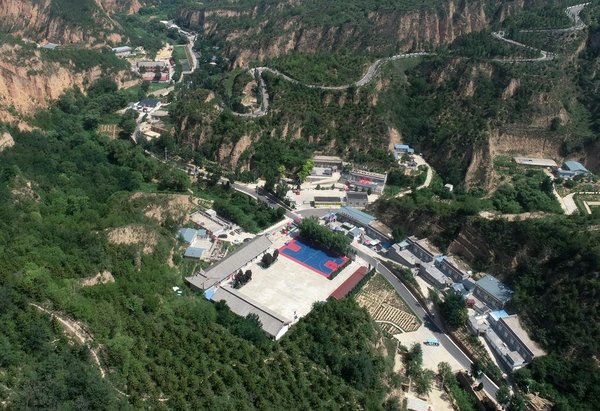Xi Story: 10 Application Letters to Join the Party
 |
| Aerial photo taken on July 29, 2020 shows a view of Liangjiahe Village of Yanchuan County in Yan'an, northwest China's Shaanxi Province. Liangjiahe Village, used to be a barren mountain village, has been lifted out of poverty through the development of rural tourism and characteristic agriculture over years. [Xinhua/Zhang Bowen] |
BEIJING, June 30 (Xinhua) — July 1 this year marks the 101st anniversary of the founding of the Communist Party of China (CPC). For each of its 96 million plus members, submitting an application letter to join the Party is a significant moment in life.
Like the millions before him, and the millions after, Xi Jinping, general secretary of the CPC Central Committee, too experienced this momentous life event. His application, however, took tremendous effort and resolve. A total of 10 application letters were meticulously penned and submitted until he finally joined the Party.
In 1969, Xi, barely 16 years old, arrived in Liangjiahe, a small village in northwest China's Shaanxi Province, as one of the urban educated youths nationwide mobilized to experience rural life and work.
Despite the sudden change of surroundings, Xi soon settled into village life and the manual labor of farm work. It was Xi's years in Liangjiahe that taught him the people-oriented philosophy and solidified his faith in the Party.
Xi's passion to serve the people was noticed by Liang Yuming, then village Party chief. Encouraged by Liang, Xi submitted his first application letter to join the Party. However, due to political circumstances at that time, the application was not immediately approved. Liang was even chastised for helping Xi submit his application.
Yet Xi did not give up. He applied again, and again, and again; nine more letters in total.
"Xi was determined to join the Party," said Liangjiahe villager Shi Chunyang. "Why? Because he cared about the people, and wanted to do practical and meaningful things for them."
In the end, the respect he had earned from the villagers for his hard work and attitude would prove to be crucially influential factors. Xi's application was finally accepted. He joined the Party in 1974, and later became the village Party chief of Liangjiahe.
"Villagers supported him. They trusted him and approved him. They all wanted to make him their village Party chief," said Yang Shizhong, a former member of the Wen'anyi Commune Party committee.
As village Party chief, Xi spearheaded a series of initiatives, including a dam that would protect farmland from floods, a methane tank to provide villagers with gas for their cooking and lighting, and a mill.
Xi always put people first and was strict with himself, Shi said. "He did a lot of practical things for the village. He took the lead among the Party members and officials."
"As a public servant of the people, I have my roots deep in the northern Shaanxi plateau because it cultivated my unchanging mission: to do practical things for the people!" Xi once wrote while recalling his years in Liangjiahe.
Since he joined the Party, Xi has always maintained his original aspiration to seek happiness for the people and rejuvenation for the nation.
Less than a month after assuming the Party's top post in late 2012, Xi put forward the Chinese Dream of national rejuvenation. Since then, he has already led the historic efforts to eliminate absolute poverty and realize the first centenary goal of building a moderately prosperous society in all respects.
It is hard to miss the same determination and faith Xi exhibited when joining the Party in these achievements, as is expressed in the Party admission oath — "be loyal to the Party, work hard, fight for communism throughout my life, be ready at all times to sacrifice my all for the Party and the people."
(Source: Xinhua)
Please understand that womenofchina.cn,a non-profit, information-communication website, cannot reach every writer before using articles and images. For copyright issues, please contact us by emailing: website@womenofchina.cn. The articles published and opinions expressed on this website represent the opinions of writers and are not necessarily shared by womenofchina.cn.






.jpg)

 WeChat
WeChat Weibo
Weibo 京公网安备 11010102004314号
京公网安备 11010102004314号